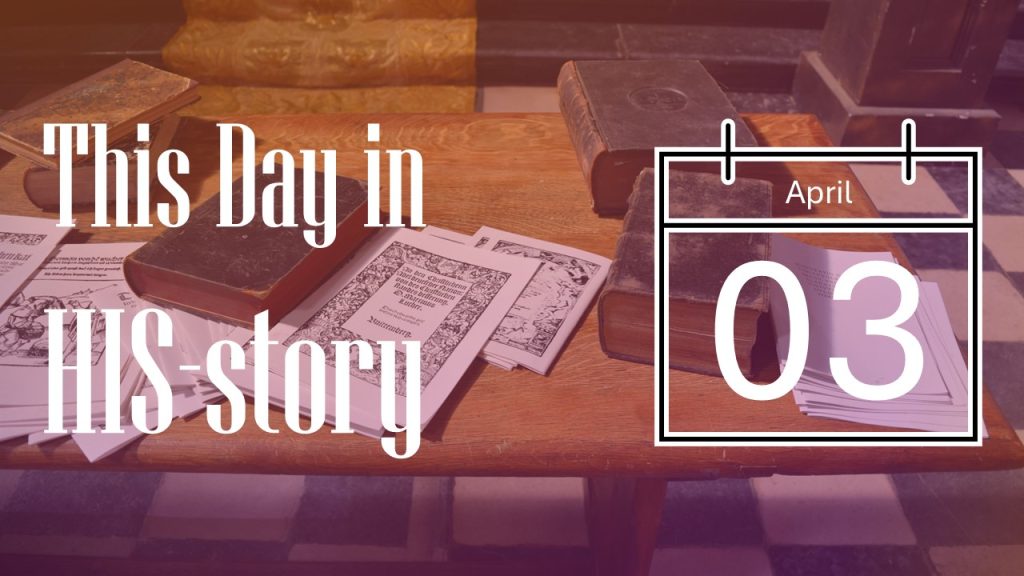
1528
When Luther sparked church reformation in Germany, there was bound to be a backlash. In those intolerant days, when church and state acted together, there was no choice in matters of faith. Someone had to be the first to die for the new ideas. One of the first two martyrs was Adolf Clarenbach.

Around 1520, Adolf Clarenbach became a teacher in a cathedral Latin school. Evidently he was a better than ordinary teacher, for in 1523 he was made principle of the city school in Wesel. But storm clouds loomed. Through reading Erasmus and Martin Luther and studying the Bible, he became a follower of the Reformation.
When his views became known, he was forced to leave Wesel. Adolf then preached in Cologne and the Rhine country, forming communities of evangelical believers.
Returning home in 1528, Adolf returned to his death. At the urging of Catholic leaders, he was arrested at Cologne on this day, April 3, 1528. He was charged with teaching Protestant ideas. Also arrested was Adolf’s friend John Klopreis. About that same time authorities arrested yet another Reformation preacher, Peter Fliesteden. Klopreis managed to escape, but Adolf and Peter remained in custody.
The two were held in prison for several months and tortured. When questioned, Adolf insisted that “there is no satisfaction for sin except the death of Christ alone.” However, good works witness that we have the faith we claim.
On September 28, 1529, Adolf and Peter were handed over to secular authorities at the gates of Cologne to be burned to death. The long delay between Clarenbach’s arrest and death is owing to the fact that three jurisdictions had a stake in his trial. Furthermore, the local citizens were upset with the sentence and had to be pacified. When plague visited the city, the superstitious people took it as a sign that they were being too kind to the heretics and public opinion swung against the prisoners.
Adolf and Peter have been called the first martyrs of the Reformation. However, it is not clear if they were Lutherans or not. But three hundred years after their deaths, Lutheran Germans of the lower Rhine honored them with a special celebration and erected a monument in their honor.
1769
If you check the index of your hymnbook, you will likely find a hymn titled “Thou hidden love of God” by Gerhard Tersteegen. Can God’s love be hidden? There were five terrible years after Tersteegen became a Christian when he had no sense of God whatever. He came close to despair.

Born in 1697, at Moers, Germany, Gerhard Tersteegen completed a few grades of school, after which he was apprenticed to an older brother, a shopkeeper. Gerhard was conscientious and thoughtful, subdued by frequent illnesses. A godly tradesman taught him that he could know Christ in daily life, and Tersteegen vowed to devote his life to God. Unable to find time for devotions during the day, he spent entire nights fasting and praying. As soon as his apprenticeship was up, he rented an isolated cottage and worked alone like a hermit, knitting ribbons to support himself. He thought much about God and read theology. His diet was as simple as could be–meal, milk and water–and he gave whatever money he saved to the poor.
His lifestyle embarrassed his well-to-do family, who came to the point they would not even mention his name. When he fell gravely ill, they left him unattended.
It was after this that darkness closed around him. For five years he had no impression of God and even began to doubt his existence. Yet he wrote hymns of faith. But mere words were not able to ease his troubled mind.
Yet one day God drew so close to Tersteegen that the sorrowing man knew absolute peace. From then until his death, on this day, April 3, 1769, Tersteegen taught others. Anyone could see that the spiritual world was real to him. Hundreds of the poor and farmers gathered daily at his home to hear him speak. He also traveled throughout the region, preaching. While at peace inwardly, he seldom had a moment’s peace outwardly, for there were always people clamoring for his spiritual advice.
Tersteegen wrote books and hymns. “Thine wholly, Thine alone I am! Thrice happy he who views with scorn earth’s toys, for Thee his constant flame; O help that I may never move from the blest footsteps of Thy love!” He even wrote a dedication of himself to Christ in his own blood.
When he was sixty-one, his constant speaking so wore him out that it almost proved the death of him. He lived nine more years, counseling, revising books and writing letters, but he was no longer able to preach or travel.
1826
Death of Reginald Heber in India. The following year, his hymns will be published posthumously. Among them will be “Holy, Holy, Holy” and “From Greenland’s Icy Mountains.”

